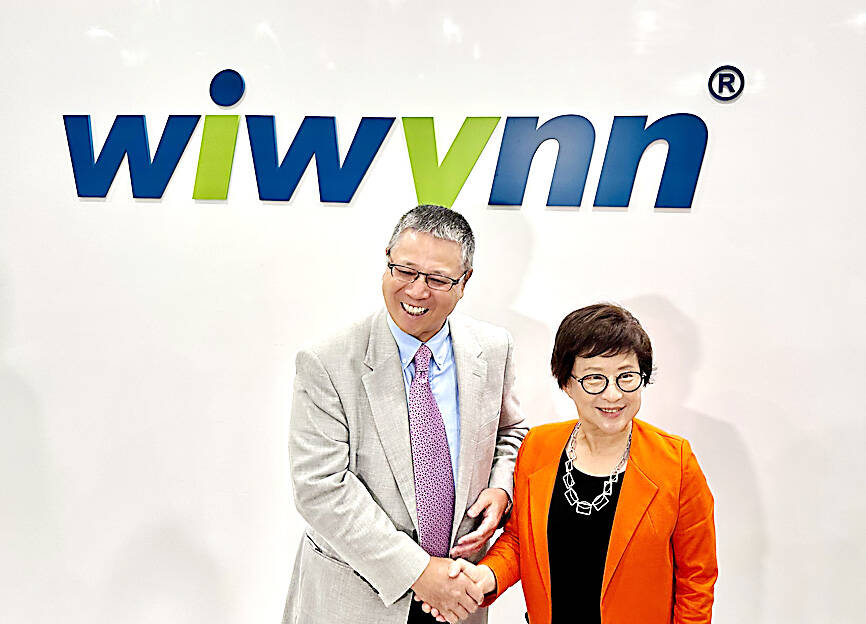Shares of cloud computing equipment supplier Wiwynn Corp (緯穎科技) yesterday rose more than 5 percent, bucking the broader market’s downturn as investors remain confident about the company’s business prospects.
Wiwynn, which makes cloud-based servers and hyperscale data centers, on Monday reported earnings per share (EPS) of NT$14.96 for the second quarter, a fall of 30.67 percent from the previous quarter and down 26.55 percent from a year earlier.
However, the company’s EPS for the first half of the year reached NT$33.82, higher than the NT$33.79 it posed for the same period last year. It was also its best performance for the period in the company’s history.

Photo: Fang Wei-chieh, Taipei Times
Analysts surveyed by financial data firm FactSet expect Wiwynn to report EPS of NT$66.14 to NT$82.06 for this year, with a median estimate of NT$71.76.
Wiwynn shares closed up 5.41 percent, while the TAIEX retreated 0.7 percent.
Its server clients are mostly large data center operators and it is also an artificial intelligence (AI) server system integrator for US cloud service providers (CSPs) such as Meta Platforms Inc, Microsoft Corp and Amazon.com Inc, competing mainly with Quanta Computer Inc (廣達), analysts have said.
“This year is challenging in light of global inflation and interest rate hikes, which are factors not conducive to enterprise purchases,” Wiwynn chief financial officer Harry Chen (陳昌偉) told an online investors’ conference yesterday.
“CSPs last year showed intentions to adjust downward their capital expenditures and they are gradually implementing their plans this year,” he added.
Chen said that prospects for next year depend on inflation and the supply-demand balance in the second half of this year.
However, the company would have greater exposure to AI servers next year, after shipping limited, tailor-made AI models this year, he added.
Regarding market speculation that the company might gain orders from the Middle East for servers using immersion cooling technology, Chen declined to comment, saying only that it hopes to optimize its customer structure and would engage with clients whenever opportunities emerge.
Yuanta Securities Investment Consulting Co (元大投顧) forecast that Wiwynn would ship 2,000 AI servers this year, increasing to 25,000 units next year and 46,000 units in 2025.
As the average selling price of AI servers is much higher than for traditional servers, they would contribute significantly to Wiwynn’s revenue in the next two years, Yuanta Securities Investment Consulting said in a note.
Consolidated revenue in the April-to-June quarter fell 25 percent from a year earlier to NT$56.31 billion (US$1.77 billion), while net profit fell 26.6 percent to NT$2.62 billion from NT$3.56 billion a year earlier, Wiwynn reported on Monday.
Gross margin last quarter increased 0.5 percentage points to 8.8 percent, while operating margin grew 0.1 percentage points to 6.2 percent due to better cost controls, the company said.
In the first half of the year, cumulative revenue grew 2.8 percent year-on-year to NT$130.53 billion and net profit rose 0.1 percent to NT$5.91 billion, with gross margin and operating margin improving to 8.5 percent and 6.1 percent respectively, it said.

GROWING OWINGS: While Luxembourg and China swapped the top three spots, the US continued to be the largest exposure for Taiwan for the 41st consecutive quarter The US remained the largest debtor nation to Taiwan’s banking sector for the 41st consecutive quarter at the end of September, after local banks’ exposure to the US market rose more than 2 percent from three months earlier, the central bank said. Exposure to the US increased to US$198.896 billion, up US$4.026 billion, or 2.07 percent, from US$194.87 billion in the previous quarter, data released by the central bank showed on Friday. Of the increase, about US$1.4 billion came from banks’ investments in securitized products and interbank loans in the US, while another US$2.6 billion stemmed from trust assets, including mutual funds,

AI TALENT: No financial details were released about the deal, in which top Groq executives, including its CEO, would join Nvidia to help advance the technology Nvidia Corp has agreed to a licensing deal with artificial intelligence (AI) start-up Groq, furthering its investments in companies connected to the AI boom and gaining the right to add a new type of technology to its products. The world’s largest publicly traded company has paid for the right to use Groq’s technology and is to integrate its chip design into future products. Some of the start-up’s executives are leaving to join Nvidia to help with that effort, the companies said. Groq would continue as an independent company with a new chief executive, it said on Wednesday in a post on its Web

JOINT EFFORTS: MediaTek would partner with Denso to develop custom chips to support the car-part specialist company’s driver-assist systems in an expanding market MediaTek Inc (聯發科), the world’s largest mobile phone chip designer, yesterday said it is working closely with Japan’s Denso Corp to build a custom automotive system-on-chip (SoC) solution tailored for advanced driver-assistance systems and cockpit systems, adding another customer to its new application-specific IC (ASIC) business. This effort merges Denso’s automotive-grade safety expertise and deep vehicle integration with MediaTek’s technologies cultivated through the development of Media- Tek’s Dimensity AX, leveraging efficient, high-performance SoCs and artificial intelligence (AI) capabilities to offer a scalable, production-ready platform for next-generation driver assistance, the company said in a statement yesterday. “Through this collaboration, we are bringing two

Even as the US is embarked on a bitter rivalry with China over the deployment of artificial intelligence (AI), Chinese technology is quietly making inroads into the US market. Despite considerable geopolitical tensions, Chinese open-source AI models are winning over a growing number of programmers and companies in the US. These are different from the closed generative AI models that have become household names — ChatGPT-maker OpenAI or Google’s Gemini — whose inner workings are fiercely protected. In contrast, “open” models offered by many Chinese rivals, from Alibaba (阿里巴巴) to DeepSeek (深度求索), allow programmers to customize parts of the software to suit their